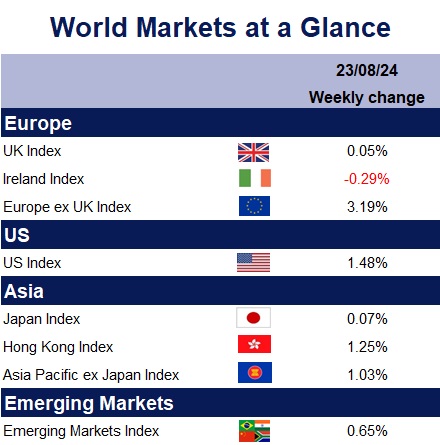Stocks have rebounded from an early-month decline as economic fears have eased. With the Fed’s September meeting approaching, investors remain optimistic about the potential for rate cuts, which would be positive news for both equity and bond markets.
This week’s US economic data was generally in line with expectations. The composite PMI edged down to 54.1 in August from 54.3 in July, while the manufacturing PMI fell to 48, remaining in contraction territory. In contrast, the services PMI continued to grow, rising to 55.2. Notably, average prices for goods and services increased at the slowest pace since January, reinforcing the likelihood that inflation will continue to trend downward in the coming months.
Turning to the UK, August’s preliminary PMI data surpassed expectations, revealing the fastest rise in private sector output since April. The Services PMI came in at 53.3 and the Manufacturing PMI at 52.5, both firmly above 50, indicating expansion. The robust performance was driven by increased business activity and a notable upturn in new order intakes. Additionally, inflationary pressures have moderated, particularly within the services sector, providing a favourable backdrop for the Bank of England. Businesses are optimistic about the near-term outlook, citing reduced political uncertainty and the possibility of further interest rate cuts as factors contributing to their positive sentiment.
Conversely, the Eurozone’s economic indicators present a more nuanced picture. While business activity across the region has increased, driven partly by services in France—likely spurred by excitement around the Olympic Games—new orders have continued to decline. Manufacturing remains under pressure, with activity below the 50 threshold at 45.6, indicating contraction. The European Central Bank’s latest minutes revealed an openness to potential rate cuts, though the ECB has maintained its current rates for now.
Japanese stocks fell sharply in early August following the BoJ’s second rate increase this year, compounded by concerns about US economic growth. Addressing these issues, Bank of Japan Governor Kazuo Ueda spoke at Jackson Hole on Friday, affirming the BoJ’s commitment to its monetary policy while expressing readiness to adjust if economic and inflationary conditions evolve as anticipated. Ueda acknowledged the current market instability, despite recent recoveries, and emphasized the BoJ’s vigilant monitoring of fluctuations in the yen’s value, which could impact the bank’s inflation targets.
Coming up next week, UK markets are closed on Monday for the Summer Bank Holiday. Data-wise, we can expect US durable goods orders, consumer confidence, and further estimates for Q2 GDP, as well as Eurozone economic sentiment, Japanese unemployment, and industrial production. On Friday, key inflation data from the Eurozone and US PCE will also be released.
Kate Mimnagh, Portfolio Economist



